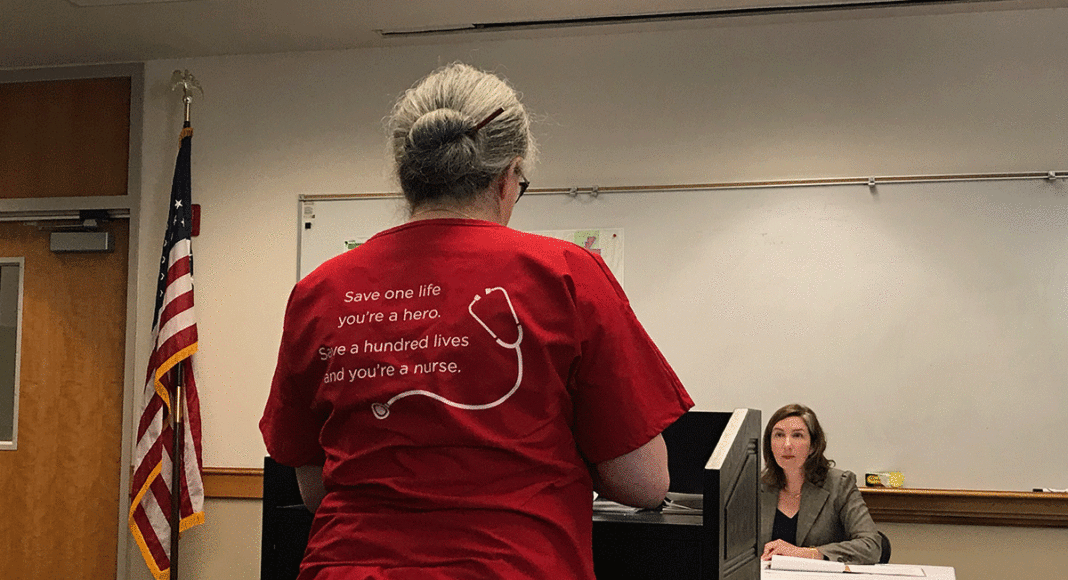The debate over a proposed $28 billion hospital mega-merger arrived in Santa Cruz this week. Tensions were high during a wide-ranging hearing Monday on the deal’s potential local impacts at Dominican Hospital.
A standing-room-only meeting in a community room at the Santa Cruz Police Department drew comments on everything from abortion and IVF to tattoo removal and insurance bureaucracy. The central question: whether or not a plan to combine Dominican owner Dignity Health with fellow hospital operator Catholic Health Initiatives (CHI) poses a threat to local jobs and medical services.
“Bigger is not always better,” said Lila DeVito, one of several nurses at Dominican who spoke in opposition to the merger currently being reviewed by regulators, at least without strict conditions. On top of voicing concerns about losing “local control” of the hospital, DeVito asked for an explicit 15-year moratorium on any possible hospital closures or restructuring that could affect Dominican or other facilities—rather than an initial five-year commitment.
Dominican President and CEO Nanette Mickiewicz, who was there with other Dignity Health and hospital executives, maintained that the current plan already contains sufficient safeguards to combine San Francisco-based Dignity Health’s 39 hospitals in three states with Colorado-based CHI’s 104 medical facilities in 18 states.
“We do not expect any jobs to be reduced,” Mickiewicz said, noting that union collective bargaining agreements would remain in place. “I want to be crystal clear: There will be no reduction to any service.”
Despite assurances—and the fact that the new Dominican ownership group is expected to be non-Catholic in affiliation—multiple speakers expressed concern about health services for women and LGBT residents. Specifically, speakers asked for more concrete guarantees on local access to abortion and in-vitro fertilization, along with availability of the morning-after pill for rape survivors.
If the merger is approved by the state attorney general, Dominican and other affected hospitals in California would be owned by a new nonprofit health group called Integrated Healthcare Operations. The name was one of several reminders of the increasingly business-centric health care industry, with Dignity Health speakers referencing “alignments,” “synergies” and “regional and subsidiary corporations.”
For residents and regulators, the focus is on whether efforts to consolidate major hospital systems in pursuit of efficiency and savings will result in better access to care—or more confusing red tape after years of debate about health care reform. Dominican, first opened in 1941, currently offers 222 hospital beds, employs more than 1,600 people and generated more than $1.8 billion in total revenue last year.
“Health care is changing,” Mickiewicz said. “This will allow us to continue caring for communities.”
While such nationwide shifts are much bigger than Dominican or any one facility, Monday’s speakers said that Santa Cruz is a prime example of the need for models to serve vulnerable populations. They mentioned homeless services, substance abuse rehabilitation and human trafficking as “social determinants of health” that all providers must be aware of.
To that end, several speakers from nonprofits that have helped fill increasingly wide gaps in the local social safety net expressed optimism that the merger would not affect longstanding partnerships or grant funding from Dignity Health. Representatives from Second Harvest Food Bank, Janus of Santa Cruz and Salud Para La Gente all supported the merger, along with Santa Cruz Mayor David Terrazas.














